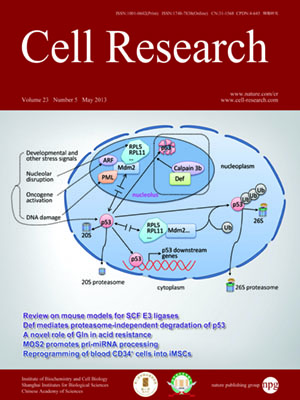
Volume 23, No 5, May 2013
ISSN: 1001-0602
EISSN: 1748-7838 2018
impact factor 17.848*
(Clarivate Analytics, 2019)
Volume 23 Issue 5, May 2013: 645-657
ORIGINAL ARTICLES
A role for the RNA-binding protein MOS2 in microRNA maturation in Arabidopsis
Xueying Wu1,2, Yupeng Shi2,5, Jingrui Li2,6, Le Xu4, Yuda Fang7, Xin Li8 and Yijun Qi3,4
1College of Life Sciences, Beijing Normal University, Beijing 100875, China
2National Institute of Biological Sciences, Zhongguancun Life Science Park, Beijing 102206, China
3Tsinghua-Peking Center for Life Sciences, Beijing 100084, China
4School of Life Sciences, Tsinghua University, Beijing 100084, China
5Graduate Program, Chinese Academy of Medical Sciences and Peking Union Medical College, Beijing 100730, China
6College of Biological Sciences, China Agricultural University, Beijing 100193, China
7Shanghai Institute of Plant Physiology and Ecology, Chinese Academy of Sciences, Shanghai 200032, China
8Michael Smith Laboratories, University of British Columbia, Vancouver, BC, Canada V6T 1Z4
Correspondence: Yijun, Qi,(qiyijun@biomed.tsinghua.edu.cn)
microRNAs (miRNAs) play important roles in the regulation of gene expression. In Arabidopsis, mature miRNAs are processed from primary miRNA transcripts (pri-miRNAs) by nuclear HYL1/SE/DCL1 complexes that form Dicing bodies (D-bodies). Here we report that an RNA-binding protein MOS2 binds to pri-miRNAs and is involved in efficient processing of pri-miRNAs. MOS2 does not interact with HYL1, SE, and DCL1 and is not localized in D-bodies. Interestingly, in the absence of MOS2, the recruitment of pri-miRNAs by HYL1 is greatly reduced and the localization of HYL1 in D-bodies is compromised. These data suggest that MOS2 promotes pri-miRNA processing through facilitating the recruitment of pri-miRNAs by the Dicing complexes.
Cell Research (2013) 23:645–657. doi:10.1038/cr.2013.23; published online 12 February 2013
FULL TEXT | PDF
Browse 2089


